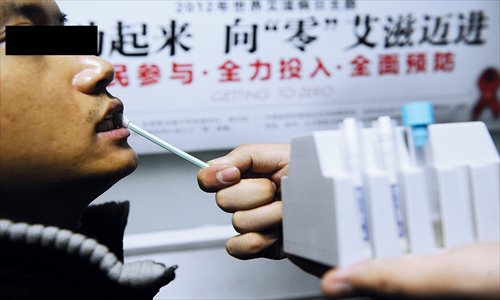NGO offers free HIV home test kits

Ahead of World AIDS Day on December 1, a local NGO has offered 200 free home testing kits, in an attempt to reach those who may be at risk of the disease, but are too afraid to approach an official organization due to privacy concerns.
But experts in the field said that ultimately, those who test HIV-positive will need to come into the official healthcare system to access treatment and benefits, despite their concerns.
Beijing-based NGO Chaoyang Chinese AIDS Volunteer Organization started offering the free saliva test kits on their website www.hivct.org from Sunday. It said that it plans to put this into long-term practice if the feedback is positive.
Xiao Dong, the director of the NGO, and who also heads up a World Health Organization HIV quick-testing program in Beijing, told the Global Times Monday that although there are many places like hospitals and disease control centers that offer free HIV testing services in the capital, not many people use them.
"We want to encourage them to have a test by offering these free saliva testing devices," said Xiao.
People only need to give their name and address to obtain the device via express mail.
"You just need a few seconds to swab the saliva and you'll get the result with the help of the instructions we posted online," he said.
The test works similar to a home pregnancy test, he said. When the swab is put into the test tube provided, after a wait of 20 minutes, the lines on the swab indicate whether it is positive or negative.
"If the result is positive, we will provide professional psychological assistance to the infected person," said Xiao.
An HIV carrier, surnamed Zhang, said he tested positive for the antibodies in 2010.
"I bought a saliva testing device online and did the test myself," he said. Zhang said he knew the result would be positive, as he had a sexual relationship with a girl who he later discovered was HIV-positive.
Zhang said he thinks using a saliva-testing device is better for those who are worried about the disease.
"I don't want to take the risk of exposing my name and ID number to hospitals," he said, adding that friends who still do not know about this might find out via the hospital.
However, some health professionals still believe a hospital HIV test is a better option, particularly if someone tests positive for the disease.
Wang Ning, deputy director of the National Center for Aids and STD Control and Prevention Center under the China centers for diseases control, told the Global Times that this service could encourage more people to do an HIV test, but having a test at a hospital or disease center is more suitable.
"Health care organizations offer free services for testing as well as professional aftercare services such as psychological help," he said.
"If the test result is HIV-positive, you will be given a final test, which costs thousands of yuan," Wang said, noting that the government will cover all the testing fees, but patients are obliged to give confirmation of their identity.
Steven Ren, from the Secretariat of the China Alliance of People Living with HIV/AIDS told the Global Times that even if you are tested as HIV-positive, you still need to go to a disease control center for a second test.
"If the result is the same, the center will issue you with a license which is the permit for you to access the medical treatment," he said.
"Besides, if you are tested at a government health care organization then you will be on the general database [to receive professional care]," said Ren.
Ren said that while he approves of the NGO providing a different method for HIV testing, whether people could receive better mental and physical care after the test is debatable.
"Otherwise, the patients' treatment could be postponed as a result," he said.
From January to October 2011, 67.45 million people were tested for HIV and 61,000 tested positive for HIV/AIDS nationwide, the Xinhua News Agency reported. There are 434,000 people living with HIV in China, the report said on December 1, 2011.
More in Daily Special